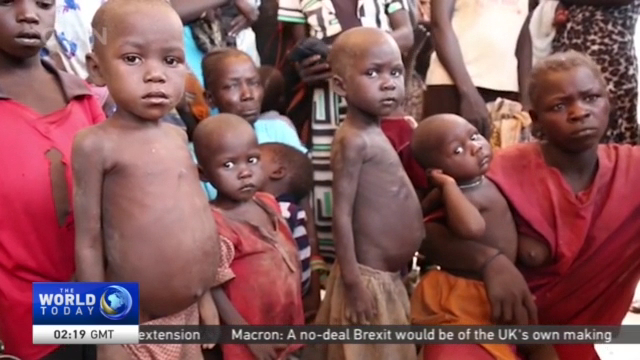
10:55, 03-Apr-2019
South Sudan Hunger: UN warns country's population in need of food, humanitarian aid
Updated
10:50, 06-Apr-2019
03:04

The United Nations warns that more than half of South Sudan's population does not have access to sufficient food, and that humanitarian aid is urgently needed. Several UN organizations say almost 7 million people in the country could face acute food shortages between May and July of this year. CGTN's Patrick Oyet reports.
Simon Zangabayo is a father of two. He struggles to provide just one a meal a day for his family. Simon is a farmer but has been unable to cultivate his crops as a result of instability in the region.
A peace deal has been in place since September last year but Simon mostly still lives in a camp for internally displaced people. He only returns home once in a while to check on his house and other property.
SIMON ZANGABAYO MARIDI RESIDENT "We come home just to pick whatever little we may need and we still have to go back to the displaced people's camp, we are still not sure of this peace but at the time when there was no war, we didn't lack what to eat, we used to cultivate and have enough food."
The UN says the root cause of the food crisis in South Sudan is the 5-year old civil war. Large-scale displacements are preventing farmers from planting crops. The world body says it's now trying to bring food to the areas where it's most needed.
SIMON CAMMELBEECK ACTING COUNTRY DIRECTOR, WFP SOUTH SUDAN "WFP plans this year to preposition almost 175,000 tonnes in more than 60 warehouses before the onset of the rainy season, repositioning food now will not only help save lives but will reduce delivery cost, making costly airdrops unnecessary."
A peace deal signed between president Salva Kiir and Opposition groups has brought relative peace in the country and many who had fled abroad are now returning. Authorities here say the food security situation is getting worse among the returning population from refugee camps.
Even though contributions are coming in from countries like China in form of rice and medicines, South Sudan's poor road network makes it difficult to distribute food aid across the country.
MANASE LOMOLE SOUTH SUDAN RELIEF AND REHABILITATION COMMISSION "A lot of people are returning from Sudan, from Ethiopia, from Uganda, a few from Kenya, from Democratic Republic of Congo and from Central African Republic, these are the targets whom we are going to give the rice."
More than two million South Sudanese people fled the country and became refugees in the East African region.
PATRICK OYET JUBA, SOUTH SUDAN "Aid agencies are now requesting funds from donors to be able to mitigate the food shortage and build community resilience so that if the current peace deal holds, the population would be able to feed themselves by the next harvest season. Patrick Oyet, CGTN, Juba, South Sudan."

SITEMAP
Copyright © 2018 CGTN. Beijing ICP prepared NO.16065310-3
Copyright © 2018 CGTN. Beijing ICP prepared NO.16065310-3